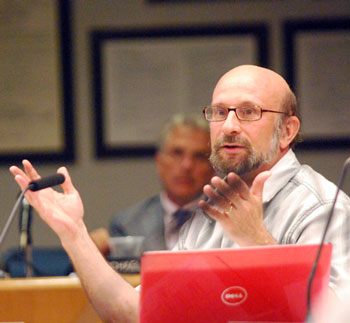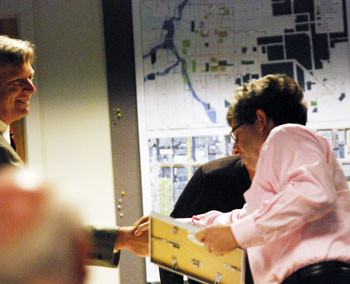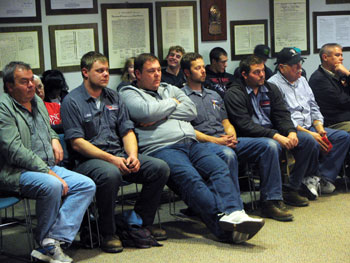Friendly foursome from Madison, Wisc. in town for the National Joint Apprenticeship and Training Committee (NJATC) of National Electrical Contractors Association (NECA). They are complimentary of Ann Arbor as a town. We received a token of their esteem – a pin for their Local 159. [photo]
Stories indexed with the term ‘labor’
County Votes to Renegotiate Union Contracts
On a 6-1 vote, Washtenaw County commissioners passed a resolution at their Feb. 6, 2013 meeting related to Michigan’s new right-to-work legislation – including direction to renegotiate union contracts. The resolution was brought forward by Andy LaBarre (D-District 7), one of three Ann Arbor commissioners on the nine-member board. [.pdf of LaBarre's resolution] Voting against the resolution was Dan Smith (R-District 2). Two commissioners – Ronnie Peterson (D-District 6) and Alicia Ping (R-District 3) – were absent.
In addition to condemning the right-to-work law and urging the state legislature to pass SB 95 and SB 96 – bills that would repeal the law – LaBarre’s resolution also “directs the county administrator and the director of human resources to engage in … [Full Story]
County Board to Revisit Right-to-Work Issue
Washtenaw County commissioner Andy LaBarre intends to bring forward a resolution at the county board’s Feb. 6, 2013 meeting related to Michigan’s new right-to-work legislation – including direction to renegotiate union contracts. He emailed a copy of his resolution to fellow commissioners and the media on Jan. 30. [.pdf of LaBarre's resolution]
In addition to formally condemning the right-to-work law and urging the state legislature to pass SB 95 and SB 96 – bills that would repeal the law – LaBarre’s resolution also “directs the County Administrator and the Director of Human Resources to engage in expedited negotiations, as requested by the Unions, with the goal of reaching four (4) year agreements to protect and extend each bargaining unit’s union … [Full Story]
State Health Care Law Prompts AATA Debate
Ann Arbor Transportation Authority board meeting (June 21, 2012): Deliberations by Ann Arbor Transportation Authority board members were uncharacteristically animated as they discussed how to comply with a state-imposed limit on the amount that public employers can contribute to their employee heath care costs. Ultimately the 4-2 vote was to act now, not later, to impose a cap of 80% on the amount that the AATA will contribute to its non-union employee health care costs.

AATA board member Roger Kerson argues against immediate action on Act 152, which limits the amount that public employers can contribute to employee health care. (Photos by the writer.)
That action meets the requirements of last year’s state Act 152, signed into law in September 2011, which limits employer contributions to a fixed dollar amount. But Act 152 also allows for the governing body of a public entity – in this case, the AATA board – to vote to cap the employer contribution at 80%, leaving 20% to be covered by employees. And that’s what the AATA board did at its June 21 meeting. Dissenting on the vote were Charles Griffith and Roger Kerson, who felt that the timing was perhaps too early – because the contract for AATA’s unionized workforce goes through the end of the year.
Based on the way that some other transit agencies in Michigan had handled their Act 152 compliance, Griffith and Kerson felt it might be possible to delay action for its non-union staff until AATA was required to act on its union workers’ health care costs. That approach is based on the idea that all employees participate in the same health care plan. However, the advice of the AATA’s own legal counsel was that Act 152 doesn’t explicitly provide for that uniform treatment of employees, just because they participate in the same health care plan.
Kerson urged that the board consider taking the AATA’s “windfall” from its compliance with the state law and reinvesting in non-health care compensation. Just because the state had given public entities a hammer, Kerson said, did not mean that they had to use it against their employees.
In other board action, the expenditure of funds for planning a north-south commuter rail project – from Howell to Ann Arbor, known as WALLY – was authorized. The money had previously been included in the AATA’s approved budget for fiscal year 2012, which ends Sept. 30, 2012. But the board had passed a resolution that requires explicit board approval before the money in the budget could be expended. AATA’s portion of the $230,000 in planning costs is $45,000, with the remainder contributed by a range of other public entities – the federal government, the city of Howell, the Ann Arbor Downtown Development Authority, and Washtenaw County.
Another planning effort that’s moving forward did not appear as a voting item on the agenda, but was included in CEO Michael Ford’s written report to the board: continued study of a possible Ann Arbor transit connector for a corridor running from US-23 and Plymouth southward along Plymouth to State Street and further south to I-94.
The AATA received a $1.2 million federal grant for an alternatives analysis phase of the study – which will result in a preferred choice of technology (e.g., bus rapid transit, light rail, etc.) and identification of stations and stops. That federal grant comes with the requirement of a $300,000 local match, which now appears to have been secured in the form of $60,000 from the city of Ann Arbor; $150,000 from the University of Michigan; and $90,000 from the AATA itself. A feasibility study for the connector has already been completed.
In other action, the board authorized the purchase of five new lift-equipped vehicles for its paratransit service. The five vehicles will replace existing vehicles that have reached the end of their useful life.
Another non-voting item on the meeting agenda, but one that was included in the CEO’s written report, was news of a collaboration between AATA and the Ann Arbor Public Schools. Starting this fall, the AATA will provide transportation for three existing school bus routes – one for each of Ann Arbor’s comprehensive high schools – by extending existing AATA routes. AAPS will pay AATA $0.50 for each student who boards, which will be counted with a pass that can be swiped through the fare box. [Full Story]
Ann Arbor OKs Fire, Police Contracts
At its March 19, 2012 meeting, the Ann Arbor city council approved new contracts with its firefighters as well as with its police command officers.
The contract with Local 693 of the International Association of Fire Fighters (IAFF) is retroactive to July 1, 2010 and runs through June 30, 2014. Ann Arbor’s firefighters have been working without a new contract since the previous agreement expired June 30, 2010. Features of the new contract include the restoration of pay to the 2008 level – the union had previously accepted a wage decrease of 3% in order temporarily to preserve jobs. The restoration to previous wage levels will take place over the course of two years, at 1.5% each year.
The contract reduces the … [Full Story]
AAPS Ended 2011 with Journeyman Contract
Editor’s note: Because the Dec. 14 meeting of the AAPS board of trustees did not adjourn until after 2 a.m., The Chronicle divided the report into two parts. The first part of the report was published before the holidays and focused only on board deliberations on contracts for top administrators: “Two Top AAPS Administrators Get Raises.”
Ann Arbor Public Schools Board of Education meeting (Dec. 14, 2011) Part 2: AAPS board of education trustees approved a contract with D.M. Burr, a Flint company, for heating, cooling, and ventilation services. Many local union members attended the meeting and spoke in opposition of the bid award to a non-local, non-unionized company.
At the opening of the Dec. 14, 2011 board meeting, board president Deb Mexicotte requested a moment of silence to acknowledge the recent loss of two students. Mariel Almendras, a second grader at Dicken, died of complications related to a rare ovarian cancer. Lucina Partis, an 11th grader at Skyline, died of accidental drowning in a bathtub in her home.
The final board meeting of 2011 also saw debate on a new state mandate to change board election dates to November in even-numbered years.
The board also discussed a number of first briefing items, and held discussion on minor resolutions. [Full Story]
DDA Gives More Time To Near North
Ann Arbor Downtown Development Authority board meeting (Sept. 7, 2011): In the main business of its September meeting, the DDA board voted to renew a $500,000 grant previously awarded to Avalon Housing for its Near North affordable housing project on North Main Street. The project is planned to include 39 units of affordable housing on the site where eight now-vacant houses stand.

Russ Collins (left) shakes hands with former board member Gary Boren, who was recognized for his service at the DDA's Sept. 7, 2011 board meeting. (Photos by the writer.)
The Near North decision came over the objection of three board members, who expressed concern over unanswered questions about the project’s timeline. Avalon had also requested that the intent of the resolution be expressed in the form of a contractual agreement and that the period of the grant be two and a half years, instead of the maximum two years normally attached to DDA grants. The additional time is needed in order to cover a sufficient period to achieve LEED certification.
Representatives of the construction trades, who objected to the selection of the Grand Rapids-based Rockford Construction as the general contractor for the Near North project, as well as a resident spoke against the DDA’s grant award during the time allowed for public participation.
The three votes against the grant renewal came from Newcombe Clark, Roger Hewitt and Russ Collins. With the absence of board members Keith Orr and Bob Guenzel, the 12-member board still achieved the minimum seven votes it needed for approval of the grant.
Despite his absence from Wednesday’s meeting, Guenzel was voted as the new chair of the DDA board, filling a vacancy in that position left when the recently elected chair, Gary Boren, was not nominated for reappointment to the board when his term expired on July 31. Boren was on hand to accept a resolution of appreciation for his service on the board.
In connection to the officer election timing issue, Clark asked for a review of the board’s bylaws by the board’s executive committee. Clark has raised the issue during the July officer elections for the last two years. Because the mayor has been reticent about his intended appointments, DDA board members have elected their officers for the coming year without knowing if all board members with expiring terms will be reappointed. Clark asked that the bylaws possibly be changed so that board officers are elected after appointments are made, so that it’s clear who will be serving on the board.
In other business, the board unanimously passed a resolution of support for the RiverUp! program amid some discussion of the appropriateness of the resolution – in light of the fact that the Huron River does not flow through the DDA tax district.
The board also passed a resolution encouraging the Washtenaw County board of commissioners to enact an economic development tax on county residents. About half of the tax proceeds would go to Ann Arbor SPARK. The resolution came at the request of DDA board member Leah Gunn, who also serves on the Washtenaw County board. The Ann Arbor city council had previously passed a resolution encouraging the county board to enact the tax. The county board gave initial approval to the tax later that evening.
As part of the reports from various board committees, Roger Hewitt stressed that the parking rates and hours of enforcement discussed at the previous week’s operations committee meeting were merely the start of the discussion. The DDA is currently discussing what kind of proposal it will present to the city council at a November joint work session on parking. Under its new contract with the city to manage the public parking system, the DDA’s authority to set rates and hours of enforcement comes with specific requirements on public input.
The city council also has directed the DDA to explore alternate uses for some of the city-owned surface parking lots in the downtown. Board members got an update on the status of the DDA’s effort to plan how to implement that directive. [Full Story]




